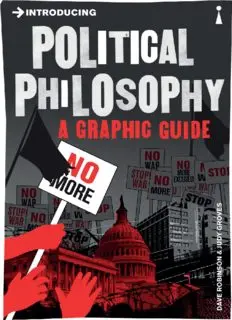Table Of ContentContents
Cover
Title Page
Copyright
Questions
Back to Basics
Natural Communities
Society and State
What is Political Philosophy
Origins in Ancient Greece
The City State of Athens
The Duties of Citizens
Direct Democracy
Asking Questions
The Sophists
Glaucon’s View of Society
Beehives and Workers
The Pure Form of the State
Government by Experts
Relative Knowledge
The Ship of Fools
Is Democracy Still Best
Aristotle and Teleology
The “Good’” Man and the Citizen
Pragmatic Reason
Aristotle’s Politics
Economic Equality
Human Nature and Beliefs
What are Ideologies?
The Ideology of Essentialism
How Free Are We?
The Effects of Evolution
What Does Evolution Prove?
Humans as Selfish Co-operators
Game Theory
Co-operators or Competitors?
Who’s Right About Human Nature?
Life Without Governments?
Politics After Aristotle
Ancient Anarchists
Roman Stoics and Early Christians
Christian Dualism
St Augustine’s City of God
The Theology of St Aquinas
“Natural” Law
The Renaissance
Machiavelli’s Prince
State Morality
Cynic or Realist?
Hobbes and Cromwell
The Science of Man
Psychological Egoists
The State of Nature
The Prisoners’ Dilemma
The Way Out
Enforceable Coercion
Sovereign Power
Absolute Monarchies
Problems with the Hobbesian View
Natural Selfishness
John Locke
Another State of Nature
Locke’s Natural Laws
Definition of Properly
The Right of Inequality
The Problem of Vendettas
The Advantages of Society
Divine Right
Governments and Citizens
Minimal Government
Changing Governments
Rebels and Regimes
Separation of Powers
Who Can Vote?
Consent or Subservience
Hume’s Criticism
Rousseau’s Political Philosophy
Civilization and Human Nature
Pre-social State of Nature
Property and Law
Natural Education
Freedom and Society
The Assembly
The General Will
Perfect Citizens and Backsliders
The Contract and the Legislator
Politics as Ethics
Corsica and Poland
State Morality
The French Revolution
The Birth of French Socialism
What is Socialism?
Charles Fourier’s Universal Harmony
Owen’s Utopian Socialism
Small-scale Democracies
Anarchism
Liberty Without Property?
Anarchist Social Morality
Hegel’s Political Philosophy
The Philosophy of Right
Citizens and the Organic State
The Constitution
The All-Powerful State
Hegel’s Metaphysics
The Dialectic
Rational Freedom and Progress
Criticism of Hegel’s State
Edmund Burke’s Conservatism
Paine’s Rights of Man
The Human Rights Issue
Right and Left Hegelians
Economic Determinism
The Inevitability of Capitalism
Wicked Capitalists
Congealed Labour
The Function of Ideologies
The Spectre of Communism
The Radiant Future
Fact or Prophecy?
Class and the State
A Stateless Society
Revolution Delayed
Developments of Marxism
Gramsci’s Theory of Hegemony
Our Political Ideology
Origins of Liberalism
The Marketplace
Free Enterprise and Equality
Contracts, Constitutions and Tolerance
What is the Use of Voting?
The Distribution Problem
Bentham’s Utilitarianism
A Science of Morals
The Free-Enterprise Market
Calculating Consequences
Useful to Government Policy
Blind Spots of Utilitarianism
Mill’s Utilitarian Reply
Qualifying the Majority
Representation by the Educated
In Defence of Democracy
Modem Utilitarianism
Rights and Minority Interests
Distribution and Equality
Nozick’s Political Philosophy
Equality of Opportunity
The Minimal State
Rawls’ Thought Experiment
Rawlsian Society
Totalitarian States
Are Philosophers to Blame?
Is Pluralist Society Best?
The Limits on Freedom
Why Should We Obey?
Communitarian Aristotelians
Postmodernist Politics
Knowledge and Power
Environmental Politics
Feminist Politics
Consumers and Citizens
Democracy by Choice
Further Reading
About the author and artist
Acknowledgements
Index
Published by Icon Books Ltd, Omnibus Business Centre, 39–41 North Road, London N7 9DP
Email: [email protected]
www.introducingbooks.com
ISBN: 978-184831-203-6
Text copyright © 2012 Icon Books Ltd Illustrations copyright © 2012 Icon Books Ltd The author and
illustrator has asserted their moral rights Originating editor: Richard Appignanesi No part of this book may
be reproduced in any form, or by any means, without prior permission in writing from the publisher.
Questions
Political philosophers ask questions about individuals, communities, society, the
law, political power, the State, and about how they all relate.
▶ Is it possible or desirable to say what human beings are “really like”?
▶ What is society? Is it something more than the people who live in it? Or was
the British Prime Minister Mrs Thatcher right to say “There is no such thing
as society”?
▶ What is the State? Is it an artificial construct or something that has naturally
evolved?
▶ How free can the State allow individual citizens to be? Are there good moral
reasons why citizens are obliged to obey the law? To what extent does the
State have the right to punish those who disobey its commands?
▶ Is democracy the best form of government?
▶ Should the State be interested in furthering economic equality? If so, should it
be allowed to interfere with other people’s private property?
DO WE NEED GOVERNMENTS AT ALL?
Back to Basics
Many political philosophers begin by concentrating on individuals. After all,
societies and states are made up of individuals first, and governments must come
after. Are political institutions simply the end result of attempts to fulfil the
essential and universal needs of individuals? But what if we have no real
knowledge about the needs and purposes of human beings? Besides, we aren’t
just dropped into society with all the ready-made capacities that make us human.

